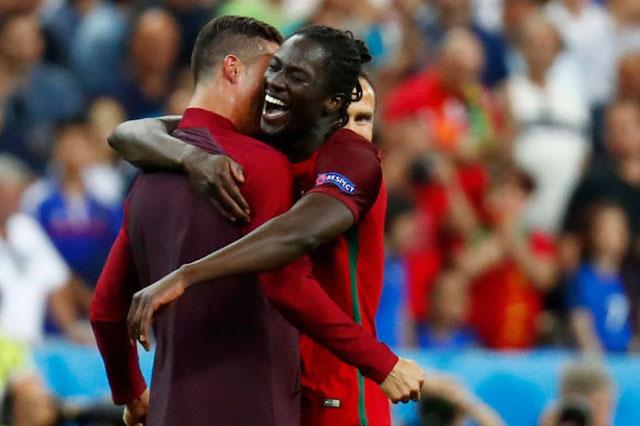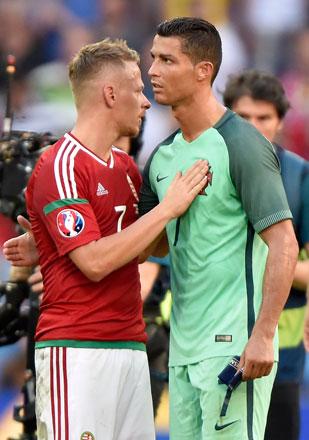You are here
Portugal’s Eder proves unlikely man of 2016
By Reuters - Dec 21,2016 - Last updated at Dec 21,2016

Cristiano Ronaldo and Eder celebrate after their victory over France in the UEFA Euro 2016 tournament on July 10 (Reuters photo)
LONDON — Portugal emerged triumphant at Euro 2016 but it was surprise packages Wales and Iceland who supplied the best memories from the tournament in France.
Not many experts chose Fernando Santos’ team as likely title winners at the start while punters would hardly have rushed to put money on his side when talisman Cristiano Ronaldo limped off in tears after 25 minutes of the July final against the hosts.
And had anyone asked fans of Swansea City whether Eder, who failed to score in 15 games for the English Premier League side before being farmed out to Lille, was a good bet to grab the winner they might have countered by saying there was more chance of Brexit followed by Donald Trump becoming US president.
But if 2016 taught us anything it is that unlikely characters can shape major events, on and off the football pitch.
Portugal’s final triumph came despite only producing one shot on target in 90 minutes plus two more in extra-time, an underwhelming end to a largely forgettable tournament where 22 of the 55 matches were goalless at half-time.
Similarities were drawn between Portugal and the Greece team that chugged to victory 12 years earlier and it was Wales and Iceland, who reached the semifinals and quarter-finals respectively, who really captured the imagination of the Euro 2016 fans.
Iceland’s followers entertained everyone with their unique “Viking Thunder-Clap” celebration.
It was not all good news among the crowds, however, with violence marring the lead-up to Russia’s game with England and several other unsavoury outbursts involving other countries.
England manager Roy Hodgson and Belgium coach Marc Wilmots paid with their jobs for failing to get the most out of their talented squads.
Italy’s Antonio Conte used Euro 2016 as a springboard, quickly forgetting the disappointment of his team’s quarter-final defeat by Germany to finish the year strongly with English league leaders Chelsea.
Portugal’s title success was particularly harsh on the player of the tournament, France forward Antoine Griezmann who produced several mesmerising performances and ended top scorer with six goals in seven games.
Less than two months earlier the same striker also lost out in the Champions League final with Atletico Madrid who went down on penalties to city rivals Real, Ronaldo this time taking centre stage to score the decisive penalty.
Third honour
Ronaldo went on to bag a third honour in 2016, beating Barcelona rival Lionel Messi to win the Ballon d’Or for a fourth time.
Other winners in 2016 included Leicester City, who overcame odds of 5,000-1 to win their first top-tier title in England while Bayern Munich, Paris St Germain, Barcelona and Juventus were more predictable champions in Europe’s other top leagues.
Juve midfielder Paul Pogba left the club at the end of the season to rejoin former team Manchester United for a world record fee of £89.3 million ($111.89 million).
United acquired a new manager in Jose Mourinho while Pep Guardiola took up residence at Manchester City as English football continued to draw the game’s top coaching talent.
It also attracted many foreign investors with Chinese businessmen snapping up several clubs as a country not known for its football tradition established a major foothold in an increasingly globalised game.
At home the Chinese Super League emerged as a likely destination for top footballers with around £200 million spent on the likes of Graziano Pelle and Hulk.
According to media reports, Brazilian forward Hulk is earning £340,000 per week, a salary bettered only by Ronaldo and Messi.
Off the field, Gianni Infantino was elected president of football’s governing body FIFA in place of the disgraced Sepp Blatter.
Infantino promised to “bring football back to FIFA” and also said he wanted to increase the number of teams that take part in the World Cup finals from 32 to 48.
Related Articles
SAINT-DENIS, France — Portugal’s players frantically tended to Cristiano Ronaldo’s left knee but their tearful captain couldn’t withstand th
ZURICH — Capping what he called the best year of his career, Cristiano Ronaldo won his fourth FIFA best player award on Monday.The double Eu
PARIS — Cristiano Ronaldo dragged Portugal back from the brink of elimination twice, and Ireland found a late goal to stun Italy and stay in

















